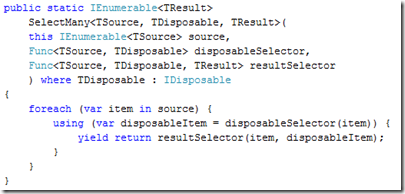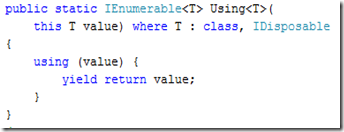Linq allows you to create new object inside of a query expression. This is useful when you have classes that encapsulate generation of a list. I’m wondering how you dispose of objects that are created that need it?
Example:
class Generator
{
public IEnumerable<int> Gen(int size)
{
return Enumerable.Range(0, size);
}
}
class bar
{
public void doit()
{
var foo =
from r in Enumerable.Range(1, 3)
from g in new Generator().Gen(r)
select g;
}
}
This will create 3 Generator objects that will be garbage collected at some point. If Generator was IDisposable how would I get the Dispose() call?
OK; I'm hoping this is coincidence, but: SelectMany; combining IDisposable and LINQ, which (with the custom SelectMany implementation) would allow:
var foo =
from r in Enumerable.Range(1, 3)
from gen in new Generator()
from g in gen.Gen(r)
select g;
(note that I'm assuming there is a sensible reason to do this per r)

or with the Using() extension method (instead of SelectMany):
var foo =
from r in Enumerable.Range(1, 3)
from gen in new Generator().Using()
from g in gen.Gen(r)
select g;

Doesn't sound like you should be creating a new Generator object on each iteration, for a couple of reasons:
Generator object is probably designed for only one instance to generate values for a given set of parameters. Of course, I may be wrong on this, so please clarify if necessary.I recommend you try the following:
using (var gen = new Generator())
{
var foo =
from r in Enumerable.Range(1, 3)
from g in gen.Gen(r)
select g;
}
If you love us? You can donate to us via Paypal or buy me a coffee so we can maintain and grow! Thank you!
Donate Us With